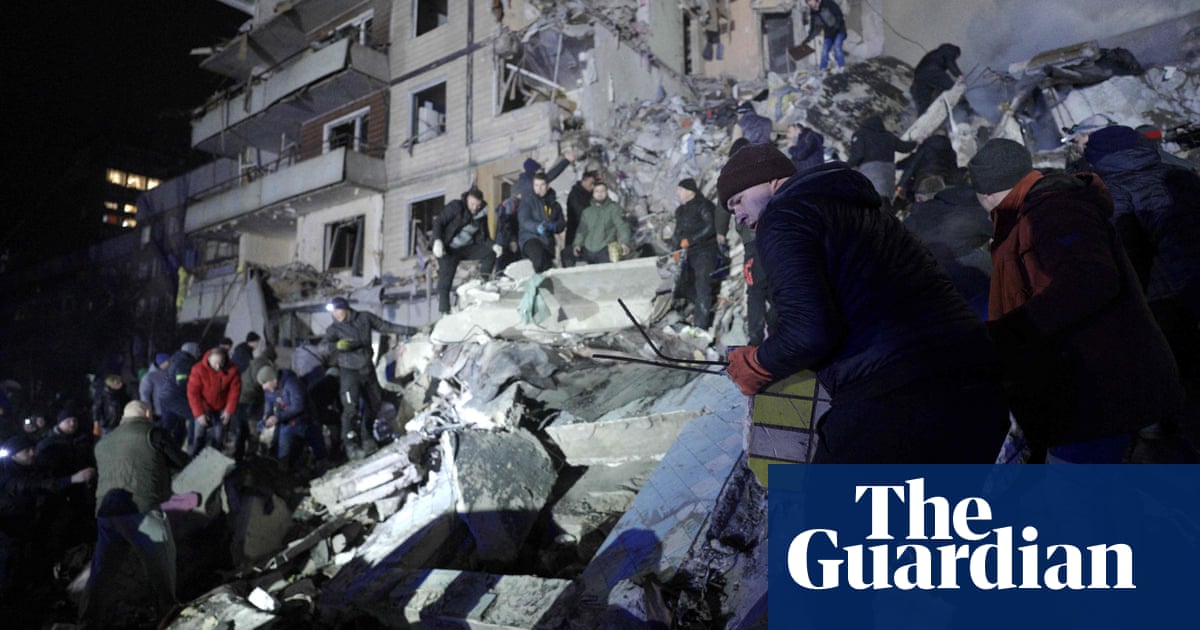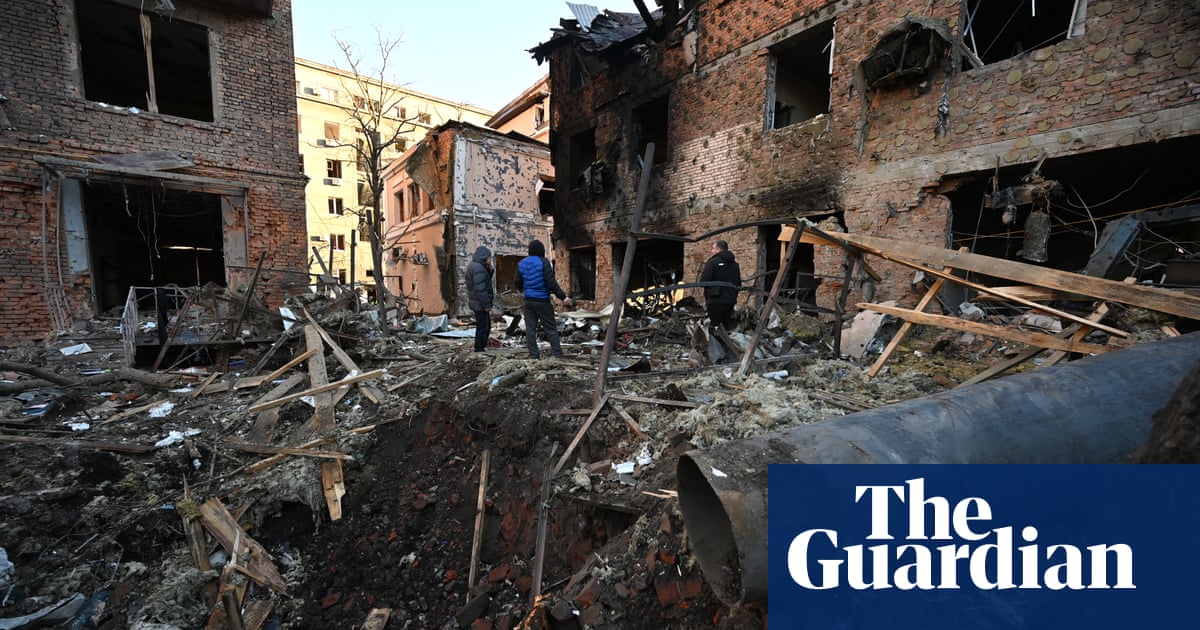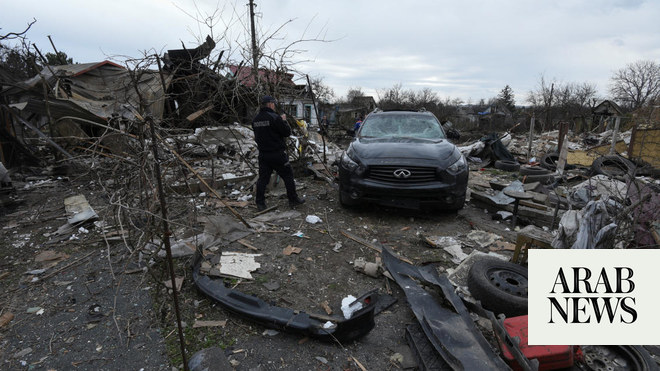
A second wave of mass strikes in days has been launched by Russia across Ukraine, with 76 rockets fired at several regions on Friday morning in what appeared to be a continuation of the Kremlin’s attempt to destroy Ukraine’s energy infrastructure.
Ukraine’s state energy company Ukrenergo said energy consumption had fallen by 50% as a result of the attacks and that it would take longer to restore the electricity supply than after previous attacks. Russia had hit thermal power plants, hydroelectric plants and substations of main networks, Ukrenergo said.
Air defence forces appeared to have caught most of the incoming rockets in places, and claimed 60 out of 76 rockets launched were downed. “I thank everyone for their work,” said Mykola Oleschuk, the head of Ukraine’s air defence forces, said on Telegram.
Ukraine’s defence minister, Oleksii Reznikov, told the Guardian in an interview earlier this week that Ukraine was winning the air war thanks to the increased efficiency of its air defence forces.
Nevertheless, energy infrastructure was hit across the country, resulting in complete outages in at least two regions as well as outages and emergency power cuts to stabilise the grid in others, including in Kyiv. Thousands of people sought shelter in subway stations deep underground during the bombardment.
The aim of these regular mass attacks, Ukraine’s authorities say, is to destroy the country’s power grid in the hope that damaging Ukraine away from the frontline will enable Russia to make gains on the battlefield.
Power outages were reported in the eastern and central regions of Kharkiv and Poltava. The mayor of Kharkiv, Ihor Terekhov, described the damage in the city as “colossal” and asked for residents to be patient while water, electricity and heating were out.
In response to Friday’s attack, the US national security council spokesperson, John Kirby, said Russia was trying to “put fear into the hearts of the Ukrainian people and to make it that much harder on them as winter is now upon them”. Kirby also said there would be another defence package for Ukraine, which will include air defence systems, but he declined to go into details. On Thursday, the US Senate passed a defence budget for 2023 that included $800m of aid for Ukraine.
On Tuesday, CNN reported that US officials had agreed to give Ukraine the powerful Patriot air defence systems that experts say would make a significant difference to Ukraine’s ability to down incoming missiles. Though Ukraine has shown increasing efficiency in stopping Russian missiles en route to targets, one successful hit on a power plant can cause damage that takes months, if not years, to rectify.
Authorities said three people had died and 13 were injured, including two children, when one of the rockets on Friday hit a residential building in the city of Kryvyi Rih in the Dnipro region.
Three explosions were heard in Kyiv on both sides of the city divided by the Dnipro River. One energy infrastructure facility was hit in the capital and nine houses in different areas were damaged, according to the head of the Kyiv region, Oleksiy Kuleba. In total, three people in Kyiv were injured, he added.
Kyiv is still suffering from water disruptions in every district, according to the city’s mayor, Vitali Klitschko, and local people reported immediate power outages and loss of mobile internet. Klitschko told Ukraine’s public broadcaster Suspilne that the water and electricity supplies should be back by Saturday morning.
The Ukrainian energy company DTEK said emergency power outages would be introduced in the city as result of the attack.
The Kyiv city administration said Ukraine’s capital had withstood “one of the biggest rocket attacks” launched by Russian forces since they invaded Ukraine nearly 10 months ago. The administration said Ukrainian air defence forces shot down 37 of “about 40” that entered the city’s airspace.
The spokesperson for Ukraine’s air forces, Yuriy Ignat, said different types of missiles had been used: “They used everything they had, except for drones.”
In comments to the Guardian, Reznikov said Ukraine’s air defence forces had honed their skills and what equipment they had over the past nine months. He said that the efficiency of those forces had gone from 50% to 80% since the war began.
On Friday, one rocket was shot down by a member of Kyiv region’s territorial defences, Ukraine’s home army of volunteers, using a machine gun, according to Ukraine’s Obozrevatel TV news.
On Wednesday, Ukraine’s air defence forces said they shot down all 13 of the Iranian-supplied drones that Russia launched at Kyiv city and Kyiv region. No casualties were reported, though a few buildings were damaged by the debris of downed drones.
Russia’s foreign ministry warned this week that if the US delivered Patriot air defence systems to Ukraine, such systems and any crews that accompany them would be a legitimate target for the Russian military. Washington rejected the threat.
Kirby also said the first tranche, worth $53m, of equipment for repairing Ukraine’s energy infrastructure had arrived in the country on Friday.
Ukraine’s foreign minister, Dmytro Kuleba, urged western partners to continue to deliver weapons to Ukraine as a response to Russia’s actions. “For each Russian missile or drone aimed at Ukraine and Ukrainians there must be a howitzer delivered to Ukraine, a tank for Ukraine, an armoured vehicle for Ukraine,” he wrote on Twitter. “This would effectively end Russian terror against Ukraine”.
In an interview with Agence France-Presse on Friday, the Nato secretary general, Jens Stoltenberg, said Russia was readying for a protracted war and that Kyiv’s Nato backers must keep sending weapons until Vladimir Putin realises he “cannot win on the battlefield”.












